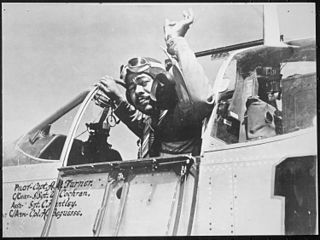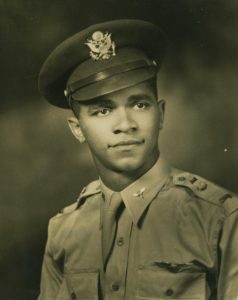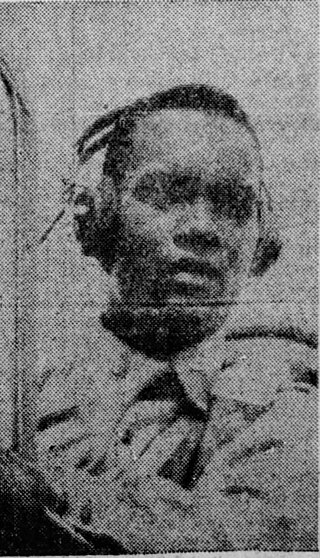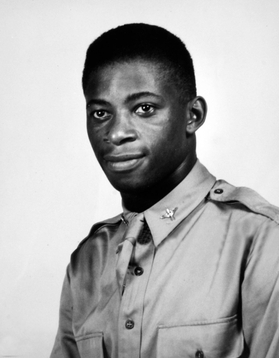See also
- All pages with titles beginning with Tuskegee Airmen
- All pages with titles containing Tuskegee Airmen
- List of Tuskegee Airmen
The Tuskegee Airmen were a group of African American pilots who fought in World War II.
Tuskegee Airmen may also refer to:

Herbert Eugene Carter was an American military officer of the United States Air Force. He was a member of the original thirty-three members of the Tuskegee Airmen. He flew 77 missions with the Tuskegee Airmen during World War II.

James Bernard Knighten was one of the first twelve African-Americans to become a pilot in the United States Army Air Corps after graduating from flight school at the Tuskegee Army Air Field. He became a member of the famed 99th Fighter Squadron, part of the World War II-era group of highly decorated African-American aviators known as the Tuskegee Airmen. Knighten flew in the first combat mission by African American pilots on June 9, 1943. Knighten's military career continued through the Korean and Vietnam Wars. After retiring from the military in 1968, he had a 20-year career with the Federal Aviation Administration as an operations inspector in New York and later in Los Angeles. Known as a jokester through his military career, Knighten began performing as a stand-up comedian in Las Vegas under the name of Jay Bernard during his years at the FAA, finally moving to Las Vegas to perform full-time after retiring from his position with the FAA.

2LT Wallace Patillo Reed was a World War II U.S. Army officer, U.S. military meteorologist, and the first ever African-American meteorologist in the U.S. military. Reed served at Tuskegee Army Air Field in Alabama as the chief weather officer responsible for the all-African American Tuskegee Airmen. Reed regularly advised Tuskegee Airmen pilots and instructors on weather maps and forecasts.
Halbert Leo Alexander was an officer in the U.S. Army Air Forces and U.S. Air Force and a fighter pilot with the all-African American 332nd Fighter Group's 99th Fighter Squadron and 300st Fighter Squadron, colloquially known as the Tuskegee Airmen. He was one of the 1007 documented Tuskegee Airmen Pilots.

George S. "Spanky" Roberts was a U.S. Army Air Force officer and fighter pilot with the 99th Pursuit Squadron and the former commander of the 332nd Fighter Group, best known as the Tuskegee Airmen.

Lincoln T. Hudson was a U.S. Army Air Force officer, World War II fighter pilot, Prisoner of War in Nazi Germany, and a corporate executive. During World War II, Hudson served in the all-African-American 332nd Fighter Group's 301st Fighter Squadron, best known as the all-African American combat fighter pilot group, the Tuskegee Airmen, "Red Tails," or among enemy German pilots, “Schwartze Vogelmenschen”.

Andrew D. Turner was an officer in the U.S. Army Air Forces (USAAF) and a fighter pilot and commanding officer of the all-African American 332nd Fighter Group's 100th Fighter Squadron, best known as the all-African American Tuskegee Airmen, "Red Tails," or among enemy German pilots, “Schwartze Vogelmenschen”.
Robert Ashby was a U.S. Army Air Force/U.S. Air Force officer and pilot with the all-African American 332nd Fighter Group – Tuskegee Airmen. He was one of the 1007 documented Tuskegee Airmen Pilots.
Lemuel Rodney Custis was a U.S. Army Air Force officer, combat fighter pilot and Squadron Operations Officer with the 332nd Fighter Group's 99th Fighter Squadron, best known as the Tuskegee Airmen. He was one of the 1,007 documented Tuskegee Airmen Pilots.

Charles DeBow was an officer in the U.S. Army Air Force and combat fighter pilot and commanding officer of the 332nd Fighter Group's 301st Fighter Squadron, best known as the prodigious, all-African American Tuskegee Airmen. He was one of the 1,007 documented Tuskegee Airmen Pilots.

Sherman Windham White Jr. †) was a U.S. Army Air Force officer and combat fighter pilot with the all-African American 332nd Fighter Group's 99th Fighter Squadron, best known as the Tuskegee Airmen.

George Levi Knox II was a U.S. Army Air Force/U.S. Air Force officer, combat fighter pilot and Adjutant with the all-African American 332nd Fighter Group's 100th Fighter Squadron, best known as the Tuskegee Airmen. One of the 1,007 documented Tuskegee Airmen Pilots, he was a member of the Tuskegee Airmen's third-ever aviation cadet class, and one of the first twelve African Americans to become combat fighter pilots. He was the second Indiana native to graduate from the Tuskegee Advanced Flying School (TAFS).
Willie Lee Ashley Jr. was a U.S. Army Air Force officer and combat fighter pilot with the 332nd Fighter Group's 99th Fighter Squadron, best known as the Tuskegee Airmen.
Graham "Peepsight" Smith † was an U.S. Army Air Force officer and combat fighter pilot with the 332nd Fighter Group's 99th Fighter Squadron, best known as the Tuskegee Airmen. He was a member of Tuskegee Airmen's fourth-ever aviation cadet program and one of the 1,007 documented Tuskegee Airmen Pilots.

Walter Irving "Ghost" Lawson was a U.S. Army Air Force/U.S. Air Force officer and combat fighter pilot with the 332nd Fighter Group's 99th Pursuit Squadron, best known as the Tuskegee Airmen or "Red Tails". He was one of 1,007 documented Tuskegee Airmen Pilots.

Willie Howell Fuller was a U.S. Army Air Force/U.S. Air Force officer, combat fighter pilot, and combat flight instructor with the 332nd Fighter Group's 99th Pursuit Squadron, best known as the Tuskegee Airmen or "Red Tails". He was the first black flight instructor for the single engine planes at Tuskegee. He was the only black flight instructor until December 1944. He was one of 1,007 documented Tuskegee Airmen Pilots. He flew 76 combat missions.
Yancey Williams was a U.S. Army Air Force/U.S. Air Force officer and pilot with the 85th Fighter-Interceptor Squadron and the 332nd Fighter Group, best known as the Tuskegee Airmen or "Red Tails".

Wilmore B. Leonard was an American college professor, U.S. Army Air Corps/U.S. Air Force officer and combat fighter pilot with the 332nd Fighter Group. One of 1,007 documented Tuskegee Airmen Pilots, Leonard was a member of Tuskegee's sixth cadet graduating class and one of the first 50 African American combat fighter pilots. He served during World War II, retiring from the military in 1946. He subsequently attended the Howard University School of Dentistry, and became a dentistry professor, holding the position for 25 years.

Edward Creston Gleed was an U.S. Army Air Force officer with the famed Buffalo Soldiers/9th Cavalry Regiment, 332nd Fighter Group’s operations officer, and combat fighter pilot with the 99th Fighter Squadron, best known as the Tuskegee Airmen. He was one of the more prominent members of Tuskegee Airmen's ninth-ever aviation cadet program, as well as one of 1,007 documented Tuskegee Airmen Pilots. His classmates included Robert B. Tresville, West Point's seventh African American graduate and the 100th Fighter Squadron's Commanding Officer.

Curtis Christopher Robinson was an American pharmacist and U.S. Army Air Force officer. He served as a fighter pilot during World War II with the 332nd Fighter Group's 99th Fighter Squadron, a component of the Tuskegee Airmen.